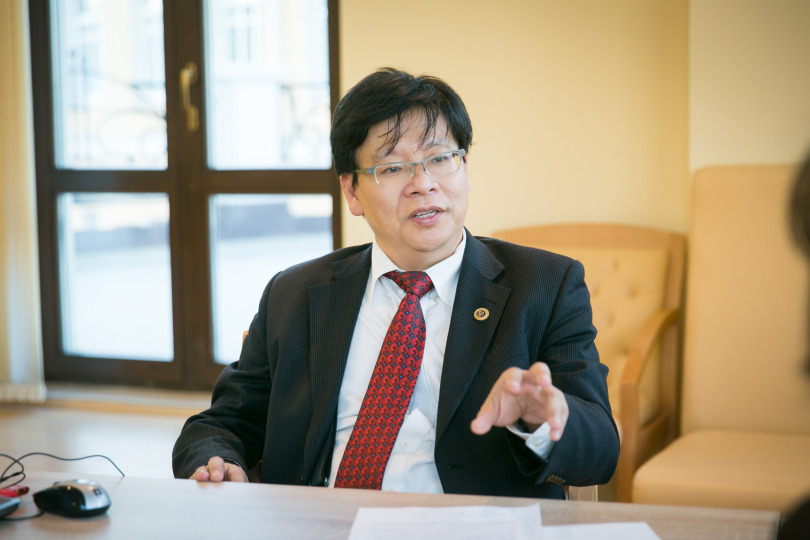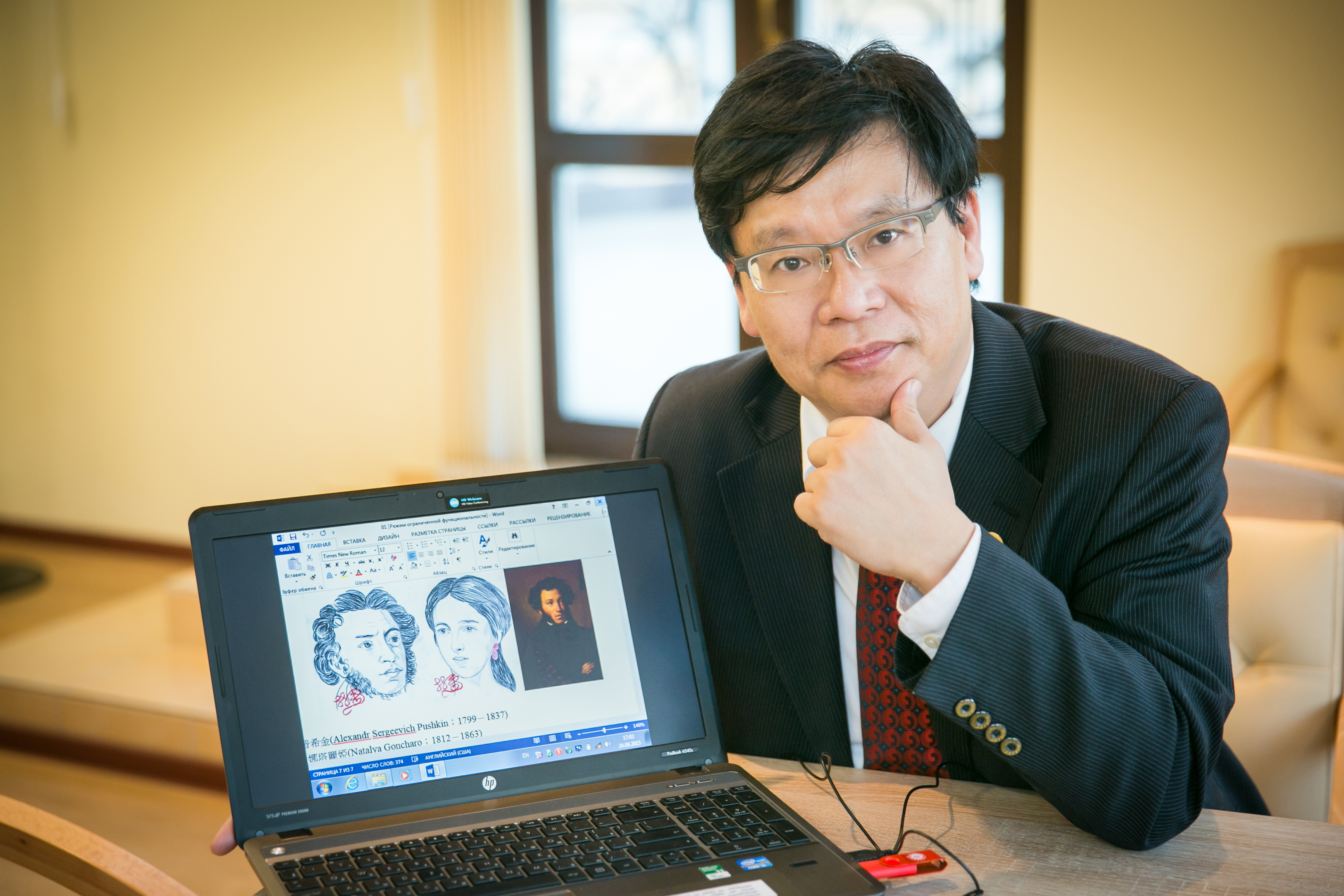‘If You Want to Collaborate with a Foreign Country, You Must Learn Its History and Culture First’

On September 24, 2015, a delegation of the Ministry of Science and Technology of Taiwan (MOST) visited HSE Institute for Statistical Studies and Economics of Knowledge (ISSEK). With the goal to identify perspective areas of cooperation, researchers of HSE and MOST delegates shared their unique fields of expertise and discussed key trends and instruments of Taiwan’s and Russia’s state policy on international cooperation in science, technology, and industrial innovation. During the visit, Dr. Yi-Bing Lin, Taiwan’s Deputy Minister of Science and Technology, gave an interview to the HSE news portal, in which he cited Karl Marx’s theory, while talking about big data and futures studies.
— You work at the cutting edge of IT research. Could you please tell us what we should expect in the near ‘digital’ future?
— My primary area of research is telecommunications and, more specifically, mobile phones. I’m a pioneer in this area. As for its future, we now witness fast growth of the so-called ‘Internet of Things’, or IoT. A huge variety of devices (mobile and other) have a lot of tiny sensors, which collect raw data. When you send these data back to the server, there is a lot of information to analyse. How can we use the data collected by IoT devices wisely? I believe that whoever masters the skill of big data analysis, will be the winner. Big data is becoming something essential, and this won’t change.
A serious problem is that some countries, for example, in Africa, don’t master this skill. If you don’t master the big data, you’ll be on the poor side of the curve. Countries that are doing so, however, learn to analyse big data and, as a result, are able to do business anywhere and beat their competitors.
Take Marx’s theory about capitalism. The rich people become richer, and the poor people become poorer. You see that this is exactly what is happening in the world and, I believe, in Russia as well. By the end of the 20th century, Marx’s theory was no longer popular, but today, people think about his theory again in order to find new ways to promote justice. How can we solve the problem? How do you create a fortune? You go to the stock market, and you make predictions. If you’re not smart enough, you lose a lot of money. Rich people always have better tools than you. The only thing you can do is to train those poor people to become rich. They should use their knowledge, and to learn how to use big data tools.
— What do you think about futures studies? Are foresight studies given high priority in Taiwan?
— You have to do foresight. Otherwise, you’ll be in very serious danger. Foresight studies should underpin government policy, in order to allow for smart allocation of resources. If you don’t do it right, you’re in a big trouble. That’s why these studies are very important. Foresight can help prevent certain problems, as it gives you an initial solution. However, when you try to implement this solution, you have to adjust it, because the environment is changing dramatically.
Within the Ministry of Science and Technology of Taiwan, there is Foresight Division, which is responsible for science and technology policy. It has a large pool of experts. One such group consists of professors. We can use their ideas, which are typically not critical but innovative. On the other hand, we have experts from the industry, who help us adapt academics’ ideas to the challenges of the real world. In addition, we also have Strategic Review Board (SRB). SRB consists of famous experts in different technology areas. They review the plans proposed by Foresight Division and make further adjustments. Once SRB has agreed on a policy, the Cabinet orders the Ministries to get involved and to contribute to policy implementation.

— Taiwan and Russia cooperate in a variety of S&T areas, both in basic and applied research. How fruitful is this partnership, in your view?
— For the past ten years, we’ve been collaborating successfully with the Russian Foundation for Basic Research, Russian Foundation for Humanities, as well as the Siberian and Far Eastern Branches of Russian Academy of Sciences. This year, we’ve moved forward with the Russian Science Foundation. We are making new investments because the previous cooperation experience has been positive. One area for collaboration between Russian and Taiwanese researchers is medical devices. This is an example of how we can transform professors’ research to industrial use. We do it a lot within Taiwan. But there is very good innovation research in Russia. We’ve already seen very fruitful results from our cooperation. There are a lot of good papers. And we are trying to investigate the papers and see whether we can transfer these studies to industrial use. Sometimes, ideas come from Russian scientists, and Taiwanese professors do the implementation. Sometimes, it’s the reverse.
— How do you see the collaboration between our countries in five or ten years?
— As I said, everything has to be adjusted. For the past ten years, we had a very solid mutual trust to do research and to collaborate. This is the most important thing: if you don’t have mutual trust, you can’t collaborate. Right now, with the Russian Science Foundation, we have a three-year programme. This morning, I talked to RSF director, Alexander Khlunov. I told him that if after three years of cooperation, both sides decide to invest more resources, it will mean that we have been successful.
We think about Taiwan-Russia cooperation from a strategic perspective. It’s important for us to collaborate with your country. If you really want to collaborate with a foreign country effectively and to come up with a good programme of partnership, you must learn its history and culture first. As a person in charge of Taiwan’s international collaboration policy, I put a lot of effort to learn about Russian history and culture in order to strengthen our partnership.
See also:
‘In the Next 20 Years, We Will Stop Aging’
The 25th Yasin (April) International Academic Conference on Economic and Social Development brought together leading Russian and Western scientists. Among the guests was Jose Luis Cordeiro, PhD, international fellow of the World Academy of Art and Science, Chair of the Millennium Project's Venezuela node, former professor at MIPT and HSE University, and author of The Death of Death.
‘The World Is Becoming More Complex and Less Predictable’: What Scientists Say about the Future
The future is now more difficult for researchers to forecast, and events that are hard to predict are playing an increasingly significant role. But there is good news too: scientists are confident that humanity will adapt to any changes. This was the focus of discussion at the International Symposium ‘Foresight in a Rapidly Changing World,’ which took place as part of the 25th Yasin (April) International Academic Conference.
HSE Foresight Centre's Work Praised by United Nations
The HSE Foresight Centre has been featured in a report by the United Nations Secretary-General as a successful example of a centralised approach to technology foresight. The document was prepared for the twenty-eighth session of the Commission on Science and Technology for Development, which is the United Nations’ focal point for technology foresight and technology assessment.
Director of the HSE International Research and Educational Foresight Centre Participates in UN Commission Meeting in Geneva
An intersessional meeting of the UN Commission on Science and Technology for Development took place on October 21–22, 2024, at the Palace of Nations in Geneva, Switzerland. ProfessorAlexander Sokolov presented new methods of scientific forecasting in his report titled ‘Science and Technology Foresight: Responding to New Agenda.’
‘Geographical Distance No Longer a Problem’: ISSEK Fosters Cooperation with Think Tanks in BRICS Countries
In September, the HSE Institute for Statistical Studies and Economics of Knowledge hosted an international working meeting with representatives from Brazilian, Egyptian, and Indian think tanks. The participants discussed opportunities for cooperation, including joint surveys, comparative studies, databases, and publications on foresight, technology, and innovation. It was also decided to draft a multilateral agreement to establish the BRICS Foresight Association.
‘An STI-Accelerated and Informed Future is Possible’
The Twelfth International Academic Conference ‘Foresight and Science, Technology and Innovation Policy’ is kicking off at HSE University on November 22. Alexander Sokolov, chair of the organising committee, talked to the HSE News Service about the evolution of the foresight agenda. Two of the conference speakers, Ibon Zugasti from Spain and Mlungisi Cele from South Africa, shared some highlights of their research.
UNESCO Chair on Future Studies Opens at HSE University
In 2022, a HSE University department joined the ranks of UNESCO Futures Literacy Chairs. This builds on the work of the ISSEK International Research and Educational Foresight Centre, and the activity of the Human Capital Multidisciplinary Research Centre. Professor Alexander Sokolov, head of the new department, Director of the International Research and Educational Foresight Centre, and Deputy Director of HSE ISSEK, spoke about the establishment, aims and objectives of the UNESCO Chair on Future Studies.
Pivot to the East: A Comprehensive Study of the Cultural and Civilisational Centres of the Non-Western World is the Top Priority
China and the Chinese world, South Asia, Southeast Asia, the Arab countries, Iran, Turkey, Central Asia and Africa are gaining new significance in Russia’s foreign policy. However, we do not know enough about the Eastern countries. It is necessary to change the priorities in education, starting from grammar school. Prospects for the development of domestic Oriental studies in the context of the new stage in the development of the system of international relations were discussed at a round table at HSE University.
‘I Admire HSE Students’ Eagerness to Learn, to Discuss, to Broaden Their Perspectives’
Robert Romanowski was a ‘Digital Professor’ at HSE University in November 2021. In his interview for the HSE News Service, he talked about the specifics of online teaching, his course on Strategic Branding, and the skills that are essential for marketing professionals today.
Russia and Africa: Time to Expand Cooperation
There is major potential for economic and humanitarian cooperation between Russia and African countries. Particularly, Russian organisations and universities can help transfer competencies and knowledge in the fields of agriculture, energy, industrial production, environmental management, climate change, and public administration. Experts and representatives of African embassies in Russia discussed these issues at the round table ‘Russia-Africa Sharing Knowledge’ hosted by HSE University.


